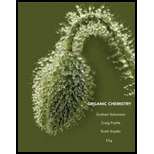
Organic Chemistry
11th Edition
ISBN: 9781118133576
Author: T. W. Graham Solomons, Craig Fryhle
Publisher: Wiley, John & Sons, Incorporated
expand_more
expand_more
format_list_bulleted
Question
Chapter 10, Problem 27P
Interpretation Introduction
Interpretation:
The relative ease of radical halogenation at
Concept introduction:
A type of halogenation in which
Expert Solution & Answer
Want to see the full answer?
Check out a sample textbook solution
Students have asked these similar questions
None
What 3 steps could you use to make the following product from the giving starting
material?
HO
Which of the following would you expect to be antiaromatic? Please provide a detailed explanation.
Chapter 10 Solutions
Organic Chemistry
Ch. 10 - Prob. 1PPCh. 10 - Prob. 2PPCh. 10 - Practice Problem 10.3 How would the molecular ion...Ch. 10 - Prob. 4PPCh. 10 - Prob. 5PPCh. 10 - Prob. 6PPCh. 10 - Practice Problem 10.7 Chlorination reactions of...Ch. 10 - Prob. 8PPCh. 10 - Prob. 9PPCh. 10 - Prob. 10PP
Ch. 10 - Prob. 11PPCh. 10 - Practice Problem 10.12 Benzylic radicals, due to...Ch. 10 - Prob. 13PPCh. 10 - Practice Problem 10.14 Show how the following...Ch. 10 - Prob. 15PPCh. 10 - Prob. 16PPCh. 10 - Prob. 17PPCh. 10 - Prob. 18PCh. 10 - Explain the relative distribution of produces...Ch. 10 - 10.20 Which of the following compounds can be...Ch. 10 - Prob. 21PCh. 10 - Prob. 22PCh. 10 - Prob. 23PCh. 10 - Prob. 24PCh. 10 - 10.25 List in order of decreasing stability all of...Ch. 10 - Prob. 26PCh. 10 - Prob. 27PCh. 10 - Prob. 28PCh. 10 - Starting with the compound or compounds indicated...Ch. 10 - Prob. 30PCh. 10 - 10.31 Synthesize each of the following compounds...Ch. 10 - 10.32 Synthesize each of the following compounds...Ch. 10 - Prob. 33PCh. 10 - Prob. 34PCh. 10 - Prob. 35PCh. 10 - Write a mechanism for the following reaction.Ch. 10 - Prob. 37PCh. 10 - The halogen atom of an alkyl halide can be...Ch. 10 - Prob. 39PCh. 10 - Prob. 40PCh. 10 - If one were to try to draw the simplest Lewis...Ch. 10 - Prob. 1LGPCh. 10 - 2. (a) Propose a synthesis of 2-methoxypropene...Ch. 10 - Use the single-bond dissociation energies of Table...Ch. 10 - 10.2 In the radical chlorination of methane, one...Ch. 10 - Prob. 3QCh. 10 - Use the single-bond dissociation energies of Table...Ch. 10 - Prob. 5QCh. 10 - Prob. 6Q
Knowledge Booster
Similar questions
- Nonearrow_forwardDraw a Newman projection from carbon 3 to carbon 2 in the highest energy conformation for the following molecule. What is this conformation called? What kind of strain is present? Brarrow_forwardWhich of the following dienophiles is most reactive in a Diels-Alder reaction: Please explain why the correct answer to this question is option 5. Please provide a detailed explanation.arrow_forward
- Which of the following would you expect to be aromatic? Please provide a detailed explanation.arrow_forwardDraw the enantiomer and diastereomers of the following molecule. Label each type of stereoisomers. Label each chiral center as R or S. HOarrow_forwardWhich diene and dienophile would you choose to synthesize the following compound? Please provide a detailed explanation. Please include a drawing showing the mechanism of the synthesis. Please also explain why it is the correct diene and dienophile.arrow_forward
- Using the sketcher below, draw the structure of N-ethyldecylamine. Answer: 0 ୨୫) . 始 {n [ ]t ?arrow_forwardWhich of the following would you expect to be aromatic? Please provide a detailed explanation.arrow_forwardIdentify the characteristic signals that you would expect in the diagnostic region of an IR spectrum of each of the following compounds. a. H₂N b.arrow_forward
- What is the lowest energy chair for the following cyclohexane? ' || || a. b. " " d.arrow_forwardAnswer the following questions using the below figure: Potential Energy ри Reaction Progress a. How many transition states occur in this reaction? b. How many intermediates occur in this reaction? c. Is this reaction spontaneous or nonspontaneous? d. Does this reaction have a positive or negative AG? e. Label the activation energy(ies).arrow_forwardDraw the following molecule as a chair in the lowest energy conformation. Then perform a chair flip. Brarrow_forward
arrow_back_ios
SEE MORE QUESTIONS
arrow_forward_ios
Recommended textbooks for you
 Organic ChemistryChemistryISBN:9781305580350Author:William H. Brown, Brent L. Iverson, Eric Anslyn, Christopher S. FootePublisher:Cengage Learning
Organic ChemistryChemistryISBN:9781305580350Author:William H. Brown, Brent L. Iverson, Eric Anslyn, Christopher S. FootePublisher:Cengage Learning Organic Chemistry: A Guided InquiryChemistryISBN:9780618974122Author:Andrei StraumanisPublisher:Cengage Learning
Organic Chemistry: A Guided InquiryChemistryISBN:9780618974122Author:Andrei StraumanisPublisher:Cengage Learning

Organic Chemistry
Chemistry
ISBN:9781305580350
Author:William H. Brown, Brent L. Iverson, Eric Anslyn, Christopher S. Foote
Publisher:Cengage Learning

Organic Chemistry: A Guided Inquiry
Chemistry
ISBN:9780618974122
Author:Andrei Straumanis
Publisher:Cengage Learning